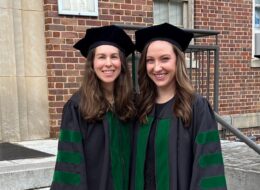News & Stories
Search & Filter
-
Pediatric Pharmacy Careers: How Roseman University Graduates Are Making a Difference
July 1, 2025Pediatric pharmacy is a meaningful and rapidly growing specialty where pharmacists make a lasting impact on the health and well-being of children. As pharmacy practice continues to expand, so does the demand for professionals trained to meet the unique and…
-
Is a Master’s in Biomedical Sciences (MBS) Right for You?
June 27, 2025If you’re aiming to strengthen your academic profile, pivot into a science-focused career, or increase your chances of getting into a professional healthcare program, a Master of Science in Biomedical Sciences (MBS) could be a smart and strategic next step.…
-
Dr. Kimberly Veltman Earns MD from UNC
June 16, 2025In 2024 Dr. Kimberly Veltman (Class of 2020) earned her Doctor of Medicine from the University of North Carolina.
-
Roseman University to Begin Planning for College of Veterinary Medicine in Nevada, Names Founding Dean
June 16, 2025Roseman University announced that it has submitted a letter of intent to the American Veterinary Medical Association (AVMA) Council on Education, formally initiating the planning process for a proposed College of Veterinary Medicine at its Henderson, Nevada, campus. The…
-
Revolutionizing Medical Education: Roseman University’s GENESIS Program Builds Community-Centered Physicians
May 16, 2025This article is included in the Spring 2025 print edition of Roseman University’s SpectRUm magazine. In a bold departure from traditional medical education, Roseman University College of Medicine is pioneering a revolutionary approach to training future physicians through its innovative…
-
Roseman University Welcomes Ariacna Baron
April 25, 2025In this staff spotlight, we highlight patient access specialist, Ariacna Baron and her work.
-
Roseman University’s EMPOWERED program announces second season of award-winning podcast focused on substance use during and after pregnancy
March 28, 2025Roseman University’s EMPOWERED program will premiere the second season of its award-winning podcast, “EMPOWERED Voices: Recovery to Resiliency,” on Monday, March 31. The podcast, which has recently honored with a Pinnacle Award from the Las Vegas Chapter of the Public…
-
Pharmacy Career Outlook: Is a Career in Pharmacy Worth It?
March 25, 2025A career in pharmacy allows individuals to play a critical role in healthcare, helping patients manage their health through medication expertise and personalized care. Pharmacists are at the forefront of patient well-being, ensuring the safe and effective use of medications…
-
SpectRUm – President’s Letter, Spring 2025
March 20, 2025Greetings, and thank you for taking the time to read this spring edition of Roseman University’s SpectRUm. This quarterly newsletter offers readers an inside look at the many wonderful things happening at Roseman. First, we are happy to share the…
-
SpectRUm – Roseman University College of Medicine Welcomes First Applicants After Achieving LCME Preliminary Accreditation
March 20, 2025Just over a month after receiving preliminary accreditation from the Liaison Committee on Medical Education (LCME), Roseman University College of Medicine has begun reviewing applications for its charter class of medical students. The milestone achievement, announced on February 14, enables…


